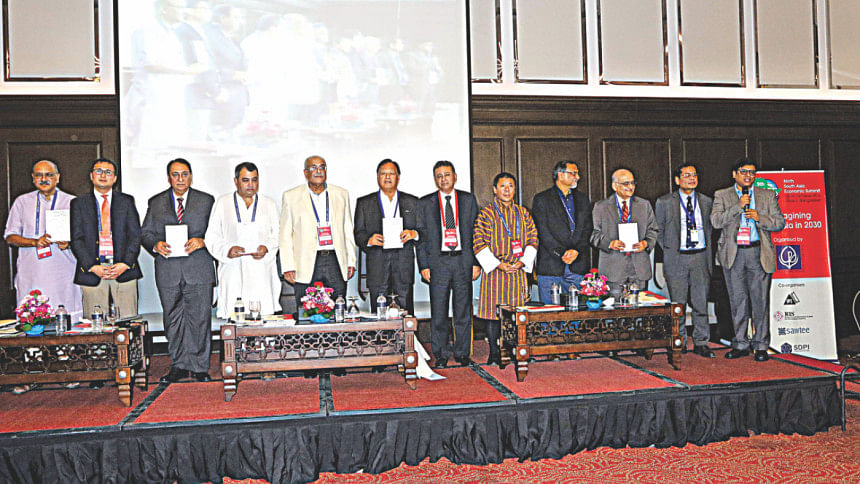Rise above politics and focus on SDGs: analysts

Politicians should rise above politics to make Saarc functional and strive to achieve the 2030 agenda, analysts said yesterday.
The recommendation comes at a time when the regional bloc's existence has come under serious question following rising tensions among a number of its member states.
“Sustainable Development Goals are an excellent framework for South Asia because what unites us is greater than what divides us,” said Saber Hossain Chowdhury, president of Inter-Parliamentary Union, a global body promoting parliamentary dialogue.
Politicians have to rise above politics if they want the betterment of the people in the region, said Rana Muhammad Afzal Khan, a member of the National Assembly of Pakistan.
“Leaders have to be magnanimous,” he said at a discussion at the ninth South Asia Economic Summit, held at the Le Méridien hotel in Dhaka.
The two-day summit on regional economies was inaugurated yesterday by President M Abdul Hamid.
The Centre for Policy Dialogue is jointly hosting this year's conference -- under the theme “Reimagining South Asia in 2030” -- along with other leading think-tanks of the region.
Debapriya Bhattacharya, distinguished fellow of the CPD, moderated the session -- “Is political leadership in South Asia ready for implementing the 2030 Agenda?”
Promises have remained unrealised and potential untapped in South Asia, even though it is one of the fastest growing regions in the world, according to Chowdhury. He said countries would not be able to attain any of the SDGs if political leaders follow the business-as-usual approach.
SDGs, otherwise known as the global goals, are a universal call to action to end poverty, protect the planet and ensure that all people enjoy peace and prosperity.
These 17 goals build on the successes of the Millennium Development Goals, while including new areas such as climate change, economic inequality, innovation, sustainable consumption and peace and justice.
Although the role of regional cooperation has not been spelled out in the SDGs, a collaborative effort among the countries would not go amiss.
“It will depend on whether countries can move to consensus from conflicts,” Chowdhury said.
The implementation of SDGs would require sustainable and rapid economic development, rapid expansion of democracy and good governance, said Sarath Amunugama, minister for special assignments of Sri Lanka.
“We are missing a lot of it [three factors] at the moment.”
He went on to blame the politicians, who are fixated on the idea of nation states and cannot go beyond it.
Political rivalry is a challenge for the region, said Choida Jamtsho, a lawmaker of the National Assembly of Bhutan. “Political leaders are not ready as a team in the region to achieve the 2030 goals.”
Pakistan's Khan said the postponement of the Saarc Summit has been a disappointment for the whole region.
“The summit provides a vehicle to hold dialogue -- you can achieve something through the dialogue.”
He said an independent, developed and stable Nepal, for example, is in the best interest of India. “And this is true for all the countries in the region.”
There is a lack of excitement among the people of the region about South Asian integration, said Amir Khosru Mahmud Chowdhury, former commerce minister of Bangladesh.
“Governments are trying to integrate the region, but people of South Asia have been left behind. South Asia should not discriminate our people,” he added.
A sub-region consisting of India, Nepal, Bhutan and Bangladesh is working within Saarc while the other part of the bloc is not functioning, said Nazir Kabiri, adviser to the finance minister of Afghanistan.
“The most successful network in the region is the network of the terrorists -- we have to get out of the hostage situation.”
He said sub-regional groups can be effective but people have to be engaged.
Despite being established more than three decades ago Saarc has not integrated although the countries share many things in areas of culture and language, said Shekhar Gupta, a leading journalist and owner of Mediascape in India.
“The region has some political and cultural strength,” he said, adding that although 40 percent of the world's Muslim population lives in the region there is no presence of terrorist outfit ISIS.
He however said he does not see any possibility of European Union-style integration of South Asian countries in the near future.
Speaking from the floor, Dr Kamal Hossain, a noted Bangladeshi jurist, said the 2030 agenda has revived the issue of empowering people.
“The 2030 agenda has given voice to the people of the region. So, political leaders have some responsibility towards implementation of the SDGs.”
The motor vehicle agreement signed between Bangladesh, Bhutan, India and Nepal can be a building block if there is coherence, said Nagesh Kumar, head of UNESCAP South and South-West Asia office in New Delhi.
Saarc has not picked up the way everybody wanted, said Jagadish Chandra Pokharel, chairperson of the Nepal Institute of Urban and Regional Studies.
“If Saarc did not pick up, other regional groups would come forward,” he added.
Bhattacharya said whether the subregional groups will make Saarc defunct is a critical question that has to be contemplated in the coming years.
The objective of this year's summit is to advance the cause of regional integration in South Asia through discussion and reflections by stakeholders on the key issues of interest and concern to countries and people of the region.
The summit organisers are CPD, the Institute of Policy Studies of Sri Lanka, the Research and Infor-mation System for Developing Countries of India, the Sustainable Development Policy Institute of Pakistan and the South Asia Watch on Trade, Economics and Environment of Nepal.

 For all latest news, follow The Daily Star's Google News channel.
For all latest news, follow The Daily Star's Google News channel. 



Comments